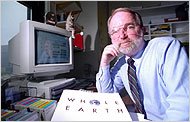In honor and memory of Dr Tom Ferguson
From the New York Times:
"Tom Ferguson, MD, who spent his life as a physician persuading people to take the reins of their own health care and to use the Internet as a powerful tool in that quest, died on April 14 in Little Rock, Ark. He was 62."
 Tom's complete New York Times obituary can be found here (free registration required; photo credit: Austin American-Stateman).
Tom's complete New York Times obituary can be found here (free registration required; photo credit: Austin American-Stateman).Those of us medbloggers sometimes think that we are such trailblazers. But we stand on the shoulders of giants in this media, just like I do in my laboratory studies. Like Peter Frishauf and Joe and Terry Graedon of The People's Pharmacy, Tom Ferguson recognized very early the power of the Internet for patient self-education.
"He urged patients to educate themselves and share knowledge with one another, and urged doctors to collaborate with patients rather than command them. Predicting the Internet's potential for disseminating medical information long before it became a familiar conduit, he was an early proponent of its use, terming laymen who did so "e-patients."
Tom lived the last quarter of his life with a type of cancer called multiple myeloma.
"When he became ill 15 years ago, Dr. Ferguson began applying the principles he had fostered to himself. "Being a doctor, he was ahead of the game," Ms. Dreiss said. "He kept with the traditional party line and did what doctors told him he should do but tweaked their advice in his own way. He read widely, worked out his own doses and was not afraid to experiment; when he heard about a clinical trial involving thalidomide, he called the drug company and told them he wanted to be in on it. He lived far longer than most people with this disease do."
Here is just a sampling of his lifetime accomplishments:
"A prolific writer and speaker, Dr. Ferguson was the health and medical editor for the Whole Earth Catalog, the voluminous compendium of goods and ideas that unexpectedly became a best seller in the late 1960's and 1970's. He also became known for a journal he established called Medical Self Care and was its editor from 1975 to 1989. In 1998, he became editor and publisher of a newsletter called The Ferguson Report: The Newsletter of Consumer Health Informatics and Online Health."
"In addition, he was author or co-author of a dozen books, including "The No-Nag, No-Guilt, Do-It-Your-Own-Way Guide to Quitting Smoking," published by Ballantine, and "Health Online: How to Find Health Information, Support Groups and Self Help Communities in Cyberspace," published by Addison Wesley."
I never had the pleasure of meeting Tom but am told that he also had a tremendous sense of humor:
"He never had a private medical practice, telling his wife, "I've saved hundreds of lives by not practicing clinical medicine.""
We've lost a giant, my medblog friends.
For more information on Dr Tom Ferguson, his legacy, and what you can do to help educate patients, cancer patients in particular, and continue Tom's vision and mission, explore this special site set up at the Association of Cancer Online Resources.


2 Comments:
Hi Abel-- Thanks!! ACOR is a great resource one of the first sites I found-- didnt konw about Tom Ferguson and his efforts to education patients. We did lose a giant.
L
Yes, indeed, in the middle of all of our concerns about the inaccurate and misleading health information on the web, we must do an equally robust job of promoting those of our peers who subscribe the philosophy of "DocTom" and others.
Post a Comment
<< Home